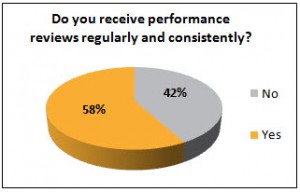In January, we shared data from five of our more recent surveys; and how that data led us to what we believe are the five internal factors critical to a company’s growth and success over time: performance reviews, team meetings, goal setting, goal accountability, and value within the organization. Together these factors, when executed correctly and consistently, is what differentiates a remarkable employee experience from a not so remarkable experience. We believe that an organization’s growth begins and ends with its employees and their perception of the organization. So, it’s no surprise that we felt these were worth a second look.
But, as with everything we do at entreQuest, we wanted more – to dig deeper, learn more, share more. Over the last five years we’ve had the opportunity to survey 1,400 individuals as part of more than 60 different employee experience focused surveys. Now, by compiling all the data from those surveys we are able to dive deeper into the critical factors necessary to a company’s growth over time.
While not all 1,400 individuals we’ve surveyed over the years were asked the exact same questions regarding performance reviews, it’s still clear that performance reviews are one of the key factors to a company’s growth and success.
Performance Review Facts at a Glance:
- Out of the 1,400 total survey participants who had performance reviews, 21.81% described the effectives of their reviews negatively with words such as harmful, ineffective, not helpful, and a waste of time. The remainder of survey participants describe the effectiveness of their performance reviews positively with words such as effective and very helpful.
- 257 of the 1,400 total survey participants were specifically asked, “Do you receive performance reviews regularly and consistently?” Of those, 58% reported that that they did receive performance reviews regularly and consistently and 42% reported that they did not receive performance reviews regularly and consistently.
IN A NUTSHELL: While the majority of employees surveyed did receive performance reviews and described them positively, almost 22% of survey participants who had performance reviews described them negatively, calling them harmful, ineffective, not helpful, and a waste of time. It also cannot go unmentioned that nearly half of the survey responders stated that they did NOT receive performance reviews regularly and consistently.
So, how crucial it is really to a company’s growth and success to have a solid performance review program/process in place? In the absence of a performance review system or one of poor quality, there will be a lack of engagement between manager and employee, a inadequate feedback loop, and no opportunity to reset with regards to vision, mission, roles/responsibility, strategies, and/or tactics.
When developing a new review system or revamping an old one, our experience shows there are six critical questions to answer:
1. What are the employees going to be reviewed on?
Our Recommendation: We suggest that you work with employees to set SMART (specific, measurable, attainable, recorded and within a time-frame) goals that are a combination of core goals (goals necessary to perform their job well), growth goals (goals that go over and beyond their current job function), and development goals that include personal and professional growth.
2. What's the frequency that you want to conduct performance reviews? Can you do so with consistency?
Our Recommendation: For most companies a semi-annual review process is adequate, but there MUST be quarterly check-ins. The check-ins ensure the employee is on track and that goals are aligned with the overall company goals.
3. What is the scoring system that you currently use and is it effective?
Our Recommendation: While there is much debate around this particular question, we find the following five-point grading scale to be well accepted by employees and effective:
- 5 – Exceptional performance: The employee exemplified exceptional performance that drastically improved the company, clients and/or teammates.
- 4 – Above average performance: The employee excels over others in a particular area and/or achieving over and beyond the set goal.
- 3 – Performance meets expectations: Goals are met.
- 2 – Needs improvement: The employee does not meet the goals set.
- 1 – Poor performance: The employee demonstrates poor performance and/or effort.
-4. How do you score goals that aren’t in the SMART format?
Our Recommendation: We normally don’t recommend goals that aren’t in a SMART format, but from time-to-time you will have goals that cannot be measure and are more subjective. For example, at entreQuest, we rate each employee on whether or not he/she has lived into our values. Below is the scoring system we use for these types of goals:
For non-metric based goals such as the values and behaviors, the employee will be rated on the following explanation using the rating system below: “Sets a strong example of [insert objective here] and inspires feelings of [insert objective here] in others.”
5 – Strongly agree, 4 – Agree, 3 – Somewhat agree, 2 – Disagree, 1 – Strongly disagree
5. What’s the reward?
Our Recommendation: The reward should be a monetary reward and should be communicated upfront. We topically build a percentage of base salary for bonuses and depending on the score, the employee is eligible or ineligible for bonuses based on the following averages:
- 5 (4.51-5.0) – 110% of bonus
- 4 (3.52-4.5) – 100% of bonus
- 3 (2.51-3.5) – 50% of bonus
- 2 (1.51-2.5) – No bonus
- 1 (0.51-1.5) – No bonus
6. Should some of the sections carry more weight than others?
Our Recommendation: Yes! It all depends on your business and objectives and behaviors will move your organization forward.
If you’re interested in learning more about developing or revamping your company’s review system, contact us today!
Joe Mechlinski is the President of entreQuest and has partnered with countless leaders to effectively improve their team’s performance, their clients’ experience, and their company’s profits.








